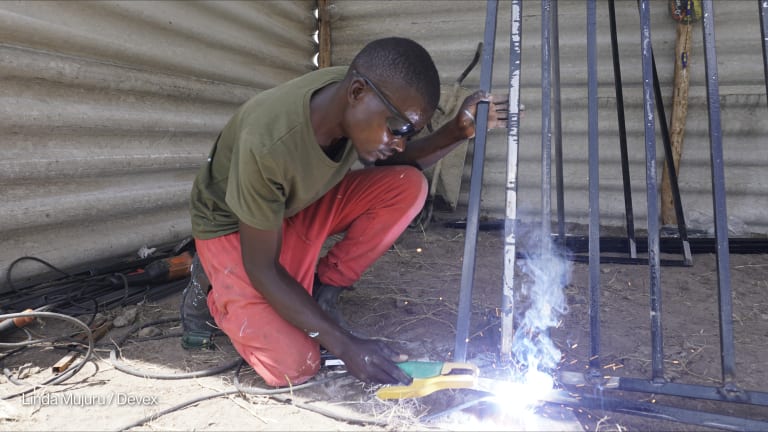
U.K. Young Ambassador to the Commonwealth Leon Ward, 23, dedicates his time to activities many adults might find surprising. In addition to a full-time job, he delivers young U.K. citizens’ views to heads of state of the 53 Commonwealth countries. He is a trustee of global development charity Plan International, and also supports a national charity campaigning on young people’s sexual health.
In short, he works tirelessly to make sure adults holding power over decisions that affect young people, such as leaders at community to country level, hear young people’s voices. Ward feels a duty to engage in civic activity.
“If there’s a way to have influence, you should grab it with both hands,” he said. “I know this role probably won’t change the world, but it will open up dialogue.”
He isn’t alone. Around the globe, countless young people are eager to shape the world we live in. But governance structures, poverty and a lack of education and employment can muffle these voices.
The development community has an important role to play in supporting young people as leaders, Ward said.
“Those we are there to serve — the young people in developing countries — need to tell us what they need and want,” he insisted.
His co-ambassador, Lola Mustapha, 20, said young people should be targeted and told about opportunities to engage with local or national issues in three ways: peer-to-peer support, school curricula and parents.
“I used to channel my anger and frustration with different systems in a very negative way,” Mustapha recalled. “I didn’t know there were things out there for me to engage in and ways to get my views across.”
After moving to a new school, Mustapha heard about a scheme to become a young mayor in her London neighborhood. The Young Mayor Network allows youth across England and Wales to elect a peer who represents their views to official governance structures. By joining the program, she began a journey that means national leaders now listen to her.
See more stories from #YouthWill Lead Tomorrow:
● What can development actors do to involve youth
● The new rebels — from activism to policy entrepreneurship
● Investing in youth resilience
● What young people want from development implementers
● Youth involvement needs to mean something
Youth participation needs innovation
Experts who work in youth civic engagement say the ways development organizations engage young people need to change. That said, methods like setting up local youth councils and youth parliaments, and getting youth involved in scrutiny groups, yield different results in different countries, according to James Edleston, the British Youth Council’s head of international. For example, the 2013 Commonwealth Youth Development Index ranked Uganda third on the political participation of young people. But Edleston questioned how free and independent youth voices might be in formal participation structures.
The British Youth Council is increasing its research into how young people are self-organizing and embracing ways of change that do not involve signing up to an organization.
“We’re seeing more local direct action, young people coalescing around local issues and organizing themselves in a way that is less structured and hierarchical,” Edleston said, suggesting organizations working with youth should learn from their example.
“Support should be to advocate for those voices rather than trying to co-opt them or bring them in,” he added.
Richard Nelmes, the United Nations Association U.K.’s head of outreach, agreed that organizations using traditional tools for youth participation need to constantly refresh what they do. He pointed to Model U.N. conferences — a role-play of U.N. meetings enacted by more than 400,000 children and young people around the world every year.
“It’s not sacrosanct,” he said. “We can strip it back to an hour of debate or have a weekend. We should find out what level students are at, what level of interaction they want and tailor it to them in terms of innovation.”
Nelmes also wants to see more innovative debate methods used to stimulate young people’s interest in civic issues. In May, UNA will for the first time host simultaneous round table debates about nuclear weapons — one between university students and one between experts — followed by a joint debate.
“It will bring into sharp relief perhaps a clash of idealism and experience,” he suggested.
Young people in tough situations need more support
It can be tough to ensure that the opinions of young people in countries with challenging governance and rule-of-law obstacles are heard. And increasing young people’s involvement in civic engagement can lead to unintended consequences, according to Matt Streng, Mercy Corps’ senior adviser for youth development.
“Often, we think as a default that youth being more civically engaged will be more peaceful and less prone to accepting politically motivated violence,” Streng said. “One of the research pieces we’ve done in Somalia showed the opposite: Young people who were more civically engaged were more likely to have participated in violence.”
Somalia is a country, he suggested, where young people are so disengaged that given the opportunity to have an influence over decisions that affect them, the only way they know how to do this is through violence. That’s why he advised development organizations to include conflict mediation and management elements into their civic activity programs.
Streng also urged international development bodies focusing on delivering youth advocacy skills to create demand for young people with such capacities. He pointed to the Arab Spring, which demonstrated the latent desire young people have to express their views; devoid of any space for meaningful political engagement, young people turned to protest and social media.
“How can we engage with strong political leaders and have them see value in opening space for political participation among young people?” Streng asked. “Without that, many of our programs focusing on civic engagement with youth will create a false sense of opportunities when that project ends.”

The impact of cultural exchange
Young leaders can be empowered through training, both within and outside of their native environments. Torki Farhat, 26, who founded the Sudanese Assembly for Youth Foundation, said his life was changed by the opportunity to take part in the Young African Leaders Initiative, a six-week program in 2013 hosted by the United States.
“I learned the real meaning of leadership, democracy and good governance, and how to set a long strategy for myself and my colleagues,” he said.
As a result, when he returned to Sudan, Farhat was able to increase his youth-led foundation’s reach from 2,000 members to more than 5,000.
The greatest barrier to young people’s civic engagement in Sudan is unemployment, Farhat said. This sentiment is echoed by another YALI fellow, Sahra Said Bile. A lack of jobs is prompting young people to emigrate rather than stay and build their country, the 30-year-old Somali said. She urged aid groups to set up long-term training programs and work with the government to improve young Somalis’ representation in governance structures.
“Even if a young person stood as a government candidate, nobody would elect them because they see them as a young person without credentials,” she argued.
By intervening, international institutions can help to provide young people with vital first steps towards becoming leaders. For example, youth leaders established the Commonwealth Youth Council in 2013 after becoming frustrated that country heads only heard their views once every two years at the Commonwealth Youth Forum. CYC now permanently represents young people living in the Commonwealth — a population of 1.2 billion. The coalition brings together all national youth councils and other youth-led civil society and private sector institutions in the Commonwealth’s 53 countries.
“There are so many things going on within the Commonwealth nations and young people’s voices are not heard, which is why we called for the establishment of the CYC,” Ahmed Adamu, the group’s chairman, said. “Now we tell the Commonwealth heads of government what young people want and what we want them to discuss in their meetings.”
Young people clearly can take a leading role in their — and all of our — futures. It’s up to their seniors to listen.
Want to learn more? Check out the Youth Will website and tweet #YouthWill.
Youth Will is an online conversation hosted by Devex in partnership with Chemonics, The Commonwealth Secretariat, The MasterCard Foundation and UN-Habitat to explore the power that youth around the globe hold to change their own futures and those of their peers.
Search for articles
Most Read
- 1
- 2
- 3
- 4
- 5








